Robotics and AI could mean 60,000 NI job losses, research finds


The Nevin Economic Research Institute (NERI) looked at the potential impact of the recent advances in artificial intelligence, robotics and other technologies on the Northern Ireland workforce and found 7% of jobs here are at risk of being lost entirely.
Most jobs (58%) are at risk of “substantial change”, according to the research.
Advertisement
Hide AdAdvertisement
Hide AdThe report highlights the importance of unionisation and collective bargaining in order to “hedge against the risks of negative job displacement.”
In their summary of the research, authors Paul Mac Flynn and Lisa Wilson write: “Rapid advancements in artificial intelligence, robotics and other forms of automation technologies have led to a re-emergence of ‘automation anxiety’ and concerns about the future of work. While automation may destroy some jobs, an equal or greater number of jobs will likely be created in the aftermath.”
The report notes, however, that many of the new jobs will not be “comparable to those that were lost”.
What this means, the authors state, is that workers are being driven towards either low-skilled or highly-skilled forms of employment and an increasing “polarisation” of the workforce.
Advertisement
Hide AdAdvertisement
Hide Ad“While traditionally most new jobs were middle-skill jobs, this is no longer the case. New jobs are predominantly in high- and low-skilled occupations and middle-skilled occupations are being crowded out,” the report states.
“This means that workers are more likely to find new employment in either of the opposite sides of an increasingly polarised labour market.”
Commenting on the launch of the report, Dr Lisa Wilson said: “Automation will bring job loss, but not to the extent that some studies have argued. In reality many factors will temper the ability of machines to replace workers.”
Paul Mac Flynn added: “While there will be jobs losses from automation, there will also be job creation. How new jobs will compare with those that are lost should be the key concern for those worried about automation”.